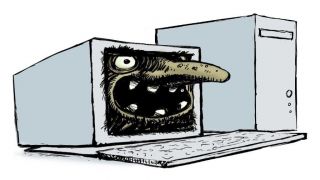Fear
Should Anonymous Comments Be Banned on Blogs?
Pro and con arguments for banning anonymous blog comments.
Posted June 2, 2015

I am a strong believer in freedom of speech. But what about a (fortunately rare) complete anonymous comment to one of my blog pieces, “How can you write such stupid shit?” The first time something like this happened, I thought long and hard, looked into the relevant editorial guidelines, and, with mixed emotions, eventually deleted the comment. The anonymous commentator responded along the lines of “You have the power to censor me, but that only shows that you deny others your freedom of expression.” In other words, the individual seemed unaware that the deletion was for the abusive language, and not for the substance of a critique—since there was no critique (the above quotes are not verbatim; they are my memory of an event a few years ago).
One solution that has been proposed is to ban anonymous comments from online journalism. For example, Kevin Wallsten and Melinda Tarsi wrote the following in the Washington Post:
Despite their ubiquity on news sites around the Internet, a movement against anonymous comments sections has slowly gathered steam over the past few years. The first call to action came in 2010 when the American Journalism Review said, “It is time for news sites to stop allowing anonymous online comments.” Since that bold declaration, a wide variety of media outlets, including ESPN, the Huffington Post, Popular Science, Sporting News and USA Today have either banned anonymous posts on their sites or eliminated comments sections altogether.
The following are some of my thoughts about the matter—pros and cons for Psychology Today adopting a no-anonymous-comments policy—but I would be interested in readers’ ideas.
- Spam. Spam may be anonymous, but it is not a form of free speech. It is a pain in the neck to all concerned, and it hinders readers in their attempts to read real comments. I have no problem with banning spam.
- Alarming (e.g., threats), profane, or extremely offensive (e.g., racist) comments. Since Psychology Today blogs offer a forum for intellectual discussion, banning anonymous comments would cut down on these.
If the main point of banning anonymous comments is to limit the gratuitous obnoxiousness and wanton personal attacks, then what about such comments that aren’t anonymous?
Alarming comments fall in the category of falsely shouting “Fire” in a crowded theater—there is no place for them.
But how should we handle profane or extremely offensive speech embedded in the context of a substantive comment? This is a real free speech problem—at present, the blogger decides whether or not to delete, and that seems reasonable to me. Maybe someone can think up a clear policy, but the best I can come up with is a judgment call, balancing the intellectual quality of the argument (but not whether or not it disagrees with the author) against the degree of offensiveness of the speech.
Here are some arguments that occur to me against prohibiting anonymous comments:
Psychology Today blogs are read around the world. My blog in particular, Looking in the Cultural Mirror, discusses issues of race and culture, and is read in many countries. Comments from readers outside the United States are often enlightening, and I have occasionally written a piece in response to a reader comment. For example, in response to my piece Are American Friendships Superficial?, a comment from an Eastern European immigrant prompted me to write another piece, Are American Friendships Materialistic?
Occasionally, comments come from people living in countries with oppressive regimes and severe restrictions on free speech. A policy of no-anonymous-comments might scare away individuals who would otherwise be willing to share critical comments about their lives and governments. In the United States, some individuals might be willing to write anonymous comments that reflect negatively on their employers, but fear of losing their job might prevent them from revealing their identity.
Banning all anonymous comments will ban serious intellectual contributions that the writer is unwilling to take public responsibility for. There are a number of benign reasons for wanting anonymity. For example, shy people or those insecure about their writing ability might be unwilling to declare themselves publicly.
In summary, a policy of keeping the door to anonymity open for some who need it allows nasty behavior by others who need not fear the consequences. Both permitting anonymous comments and preventing them have advantages, and both have disadvantages.
It seems to me that there are a lot more abusers of anonymity than those who need it, so I’m inclined to go with a ban.
What do you think?
Check out my most recent book, The Myth of Race, which debunks common misconceptions, as well as my other books at http://amazon.com/Jefferson-M.-Fish/e/B001H6NFUI
The Myth of Race is available on Amazon http://amzn.to/10ykaRU and Barnes & Noble http://bit.ly/XPbB6E
Friend/Like me on Facebook: http://www.facebook.com/JeffersonFishAuthor
Follow me on Twitter: www.twitter.com/@jeffersonfish
Visit my website: www.jeffersonfish.com




